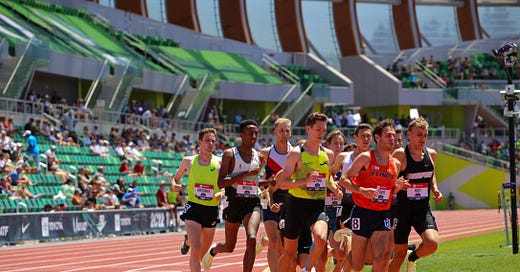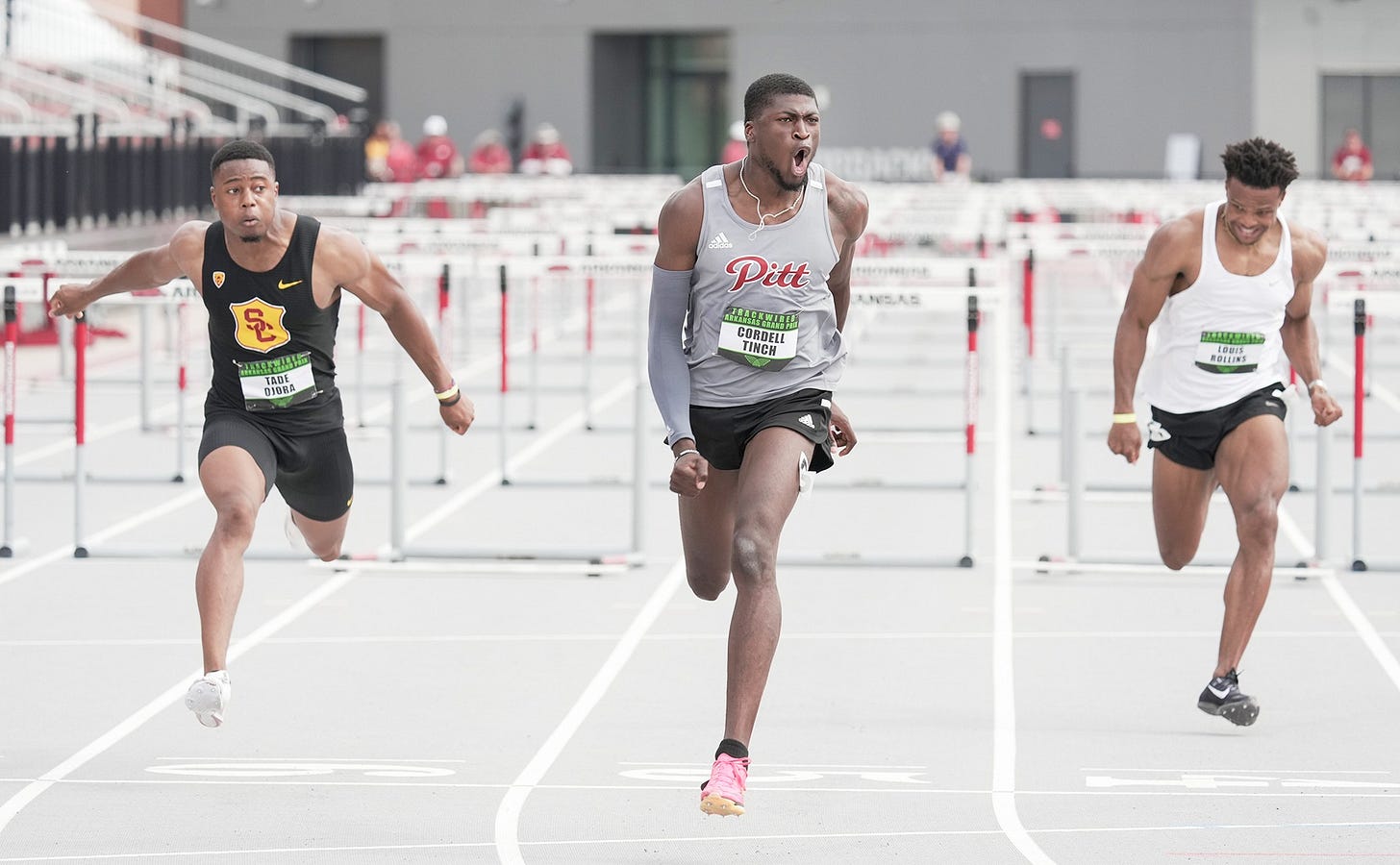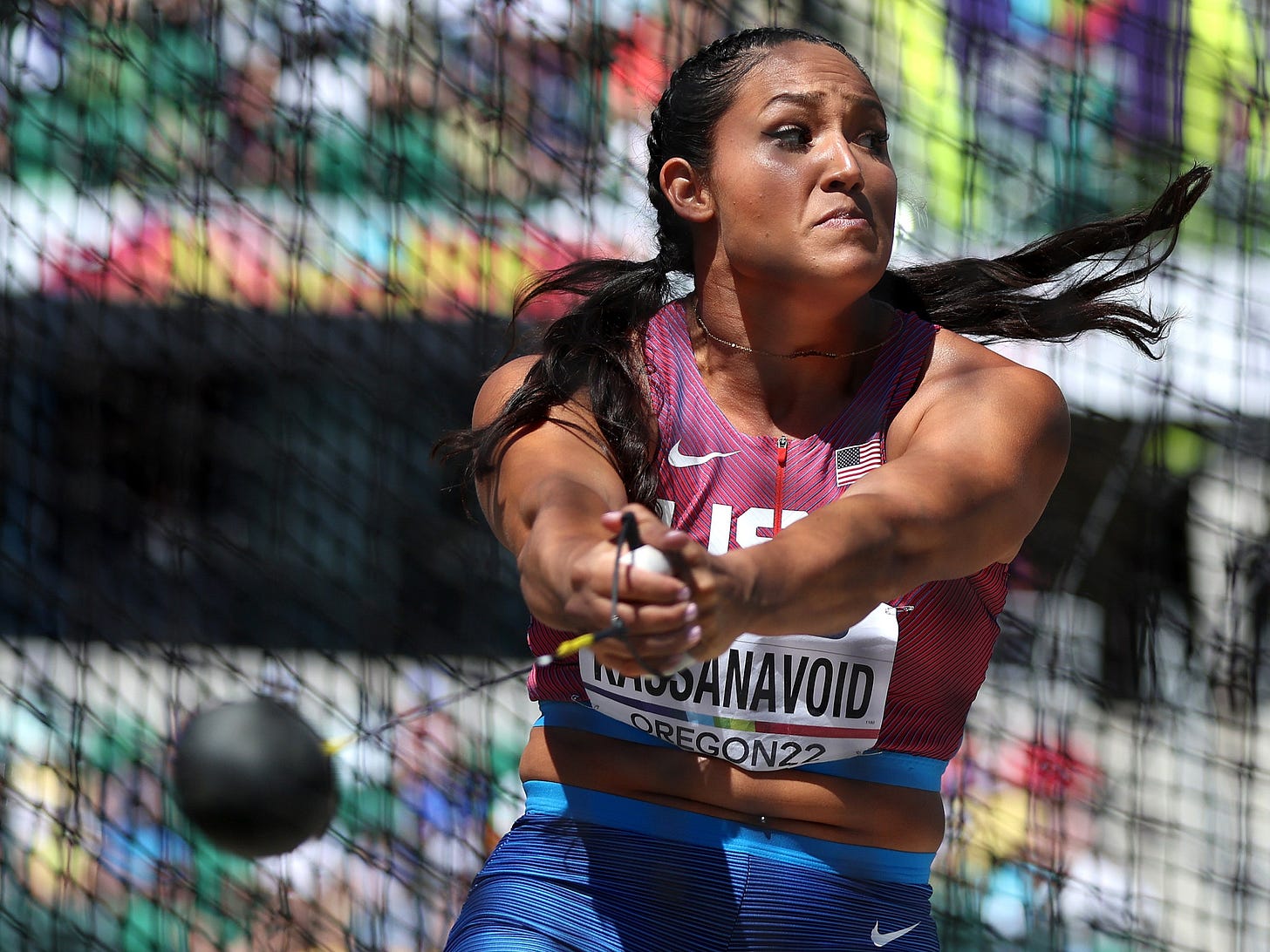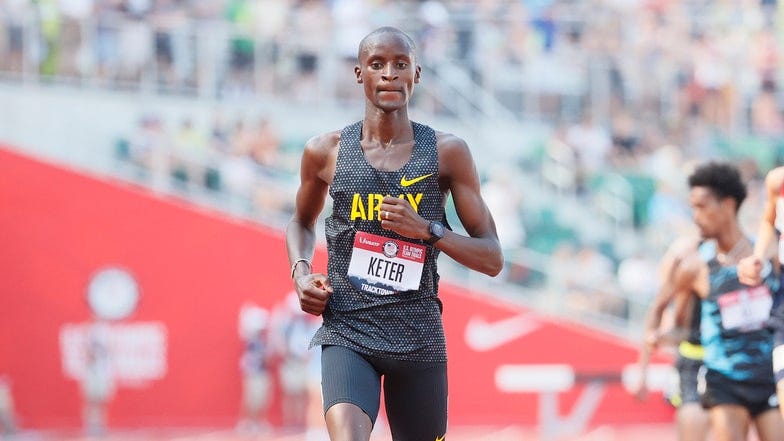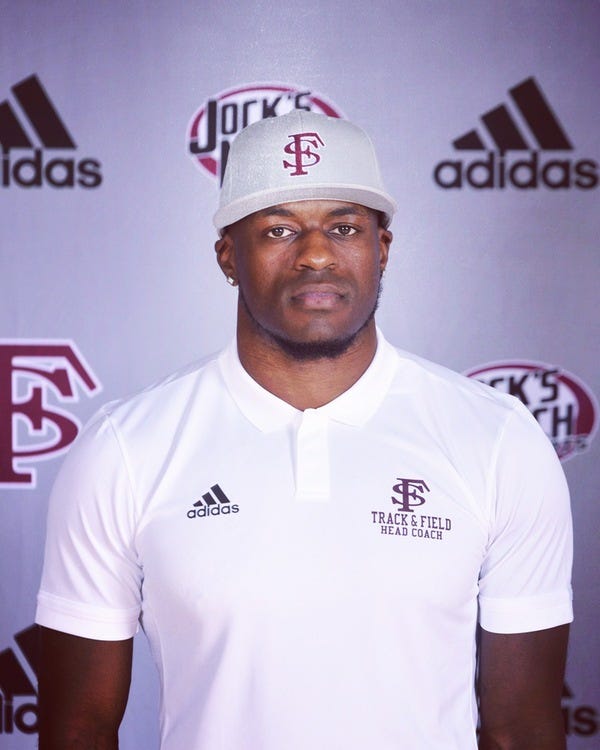** This newsletter was originally sent out Thursday afternoon at 4pm, and again on Friday, but something was wrong in the settings, so I’m hoping that the third time is charm ** 🤞
The Heartland Distance Summit 📝
The sports of track & field and cross country are constantly changing and advancing. Some say carbon-plated shoes are the impetus for change, while would some argue that it’s the emphasis on recovery. Though both are true, one of the most important factors in the evolution of the sport is the type of training and the coaches that are transforming the way athletes improve. This year, the Heartland Distance Summit is bringing in another incredible year of coaches who are willing to share their expertise and the experiences that have made them some of the best coaches in the region and the country.
Register for the 2023 edition here, and join coaches from all over the country on July 20th and 21st to hear from …
Will & Samantha Palmer (University of Alabama & Florida)
Jesse Coy (Rapid City Stevens High School, South Dakota
Eric Dettman (Lincoln High School, Oregon)
Eric Carroll & Dr. Randy Mijares (Trinity Academy, Kansas)
Local Panel ——————
Kelsey Carbajo (Olathe West)
David Chatlos (Liberty North)
Rikki Hacker (Shawnee Mission East)
Ryan Unruh (Blue Springs South)
Just say it’s Division I only😒
Every year, The Bowerman Award is handed out to the “most outstanding male and female NCAA track & field athletes in the nation.” The prestigious award looks at an athlete’s NCAA seasons, including both indoor and outdoor performances. Named after legendary coach Bill Bowerman, the highly sought-after award has been presented to athletes who have gone on to win gold medals and set world records. Since it’s debut in 2009, the award and its corresponding committee have seemingly nailed the picks every year, with minimal pushback from the track & field community.
Athletes’ performances during the NCAA indoor track & field and outdoor track & field seasons shall be considered. An athlete need not have competed in both seasons to be eligible for the award.
Only performances from the NCAA indoor track & field and outdoor track & field seasons of the year in which the award is given are considered. For example, performances from the 2009 outdoor track & field season should not be considered for the 2010 award.
Performances that occur outside the NCAA seasons of indoor track & field and outdoor track & field should not be considered. The performance window for the purposes of The Bowerman runs from December 1 of the preceding year through the respective division’s NCAA Outdoor Track & Field Championships in the year in which the award is given (e.g. 2010).
Performances achieved while competing unattached during the indoor track & field or outdoor track & field seasons should not be considered, unless the athlete is competing on a national team at a competition that occurs during The Bowerman performance window (e.g. World Indoor Championships).
Performances achieved in cross country, or in any sport other than indoor track & field and outdoor track & field, should not be considered.
First and foremost, all three finalists, Kyle Garland, Leo Neguebauer and Jaydon Hibbert are terrific athletes and have done more than enough to be in the final three, so please don’t take anything that follows as a dig or an attempt to discredit the championship athletes. But that doesn’t mean that Cordell Tinch doesn’t deserve to be there, because he does, 100%.
Personally, I feel that there are two primary factors that played significant roles in having him left out of the top ten semi-finalists, and they’re both completely out of his control.
Tailwind
During his 2023 NCAA outdoor campaign, Tinch raced the 110mH on eight different occasions, and only had a legal tailwind for three of them. In his two wind-legal races he still produced the fastest time among all collegians. Two out of his three legal tailwind races also came within the first two weeks of the season, which meant though he was improving and progressing in fitness, only one of the races out of his last five would be able to count towards anything. It also seems that a lot of fans of the sport can’t (or they simply didn’t want to) comprehend that a strong tailwind is not on the hurdler’s side. An illegal tailwind pushes a hurdler over the hurdle itself just enough that it begins to negatively impact their form and technique, resulting in their stride being altered and them having both less time and steps in between hurdles. The fact that he ran a 12.97 and a 12.87 with illegal tailwind is incredibly impressive, and not for the faint of heart.
The DII Bias
Whether they’ll admit it or not, the fact that Pittsburg State is a Division II program and not Division I impacted Tinch’s chances of being named a finalist. It’s the same bias that kept 400mH from staying on the list more than a week, despite his great season in the 400mH, 60mH and 400m. It’s also not fair to discredit Pittsburg State, because even though they’re DII, there are A LOT of DI programs that would simply not be able to keep up with them.
Tinch also won five DII national titles this track season, winning the indoor 60mH and high jump, as well as long jump, high jump and the 110mH on the outdoor oval. Based off of championship results, Tinch would have won both the 60mH and 110mH a division up, as well as a runner-up finish in the long jump, and a 4th and 5th place finish in the indoor and outdoor high jump. After a quick browse and a little bit of data collection, my knowledge leads me to believe Tinch also would have been the high scorer at the Division I championship, totaling twenty-two points across his three events.
Overall, when I was writing this, I was frustrated, both as a fan of his and as someone who is passionate about the sport. It’s incredibly rare for an athlete of Tinch’s caliber to be running his times and dominating in the fashion that he is, especially in Division II. It’s unfortunate that the committee failed to see his ability, but so be it. Flash forward to today, the first of four days of track & field in Eugene, The Bowerman is the least of his concerns, and now his sole focus is finishing in the top three in Sunday’s grand finale.
Also, since Tinch was left off the list, he turned pro and signed with Doyle Management, the same team that represents athletes such as Ryan Crouser, Anna Hall, Clayton Murphy, and many more of the best athletes in the world.
USA Championships on deck🇺🇸
This week is a little bittersweet for me as a track & field fan, primarily because it’ll be the first time since pre-covid that I’m not sitting in a half-empty Hayward watching track & field in 90 degree heat. Fingers crossed everything works out and I am able to make it to the Diamond League Final in September!
Regardless, this week is the biggest meet of the American season up to this point, and it’s sure to be action-packed regardless of who you’re cheering for. There are quite a few Kansas high schoolers, collegians and alumni who are trying to punch their ticket to Budapest, and here are a few of the biggest Kansas names that will be in contention.
Obviously, Cordell Tinch is an athlete to pay attention to even if you somehow don’t know who he is. The fastest man in the world is looking to keep his momentum from a record-breaking outdoor season going, by contesting both the long jump and his trademark event, the 110mH. Lou Rollins, who made it out of the heats a year ago, will also toe the line, making it two former Pittsburg State athletes in the hurdles.
Brett Meyer, one of the only men in the state’s history to ever break four-minutes in the mile, is back again after making the final a year ago. The men’s 1500m this year is absolutely loaded, with the last four champions back in the field. Matt Centrowitz, Craig Engels, Cole Hocker and reigning champ Cooper Teare, along with American record holder Yared Nuguse and ten more men under 3:26 will all be jockeying for three spots, and Meyer is in the thick of it and will be a threat.
As of about a year and a half ago, USC’s William Jones was set to go play baseball at Southern University, but after he ran a 46.29 last May, his plans changed. Now, he’s the 7th fastest seed in the 400m, and has a very strong chance of going to Budapest either in the open, or as a part of one of the USA relay teams.
In the 800m, Jayhawk legend and 2019 Doha 4th place finisher Bryce Hoppel will be looking to defend his 2022 USA title, which will be easier said than done. Hoppel is one of just three men under 1:45, but an additional seven men are under 1:46, meaning it’ll be a tight-knit bunch. However, Hoppel is not even the slightest stranger to pressure, and after a few years at this level, has gained the experience to perform best when it matters the most.
A few more Jayhawk alums include Zach Bradford and Honour Finley, who are competing in the pole vault and the 800m. Bradford was a Jayhawk up until this year, after transferring to Texas Tech as a graduate transfer. Bradford is tied for the third best mark in the field, but is going up against three of the best and most consistent vaulters in the world, as well as a deep field. Bradford has also been on this stage before, so he’s no stranger to pressure. Finley will be testing her fitness in the second heat of the 800m tonight. She’s ran 2:02.5 this season, which also happens to be her PR.
The only 2022 World Championships medalist on this list, Janee’ Kassanavoid, will be looking to qualify for her second straight championships, as she’s currently ranked #4 in the world. Americans currently sit 1-3-4-5-6 in the world, but thanks to Brooke Anderson’s world title last year, four American women instead of the traditional three, will get to travel to Budapest next month. The 2022 bronze medalist is surely going to represent Team USA again, but the order in which they’ll finish is up in the air.
Another athlete who is no stranger to wearing the good ol’ red, white and blue is Cloud County alum Benard Keter, who has qualified for the last two global championships, and is surely looking for a third. This year as always will be tough, simply because the steeple is a wildcard every time it’s run, but the 2023 field is without the two men who have won the last ten US titles. Evan Jager and Hilary Bor will both go without a chance to qualify due to injury, making Keter the only returner from last year’s USA steeple team. Keter is the fifth fastest man in the field, but like I said, the steeple is no person’s friend and is capable of anything.
Rylee Anderson will be competing in the high jump this weekend, where she’ll look to trade her crimson and yellow for some red and white. Anderson enters the meet with the third best mark, but there are quite a few women hot on her trail. Anderson’s currently jumping the best she ever has, which means she’s got some momentum propelling her.
On the distance side of things, two high school legends Alli Cash (Shawnee Mission West) and Emily Venters ( Lawrence Free State) are competing in the 1500m and 10,000m. Cash ran. 4:08.60 during the qualifying window, and sits in fourteenth heading into the heats, but there are a few athletes ahead of her doubling or even tripling up, so nothing is remotely set in stone. Venters, who had a breakout season at Utah, is coming off a runner-up and third place finish in the 10,000m and 5000m last month in Austin, TX. She is ranked 9th in the field, and is a definite wild card to make the national team.
In the U-20 ranks, Kansas will again be well-represented, whether it’s on the track or the field.
Nike Outdoor champ and state record holder Bryce Barkdull enters the pole vault competition as the top seed by 2.25 feet, as he’ll look to add even more trophies to his 2023 shelf. Middle school phenom Aria Pearce is doubling up in the 100m and 200m, and will have A LOT of fast competition alongside her. Kansas State signee and 2023 high school 400m leader Tavon Underwood will be contesting both the 200m and 400m. Coming off of his first year at KU, Grant Lockwood will be running the 400m as well, coming off a season that saw him lower his PR to 46.63. Teammate Sawyer Schmidt will be running the 1500m, entering the field as the fourth fastest and one of eight men under 3:50.
Thanks to the incredible work by Citius Mag, you can find the schedule for the championships here, along with heat sheets, and a guide on where you can watch the championship live. You can also find live results here.
#BuildTheFort: Interview w/ Fort Scott’s Philip Redrick🏰
Since he took the reins of the Fort Scott Community College track & field program, the Greyhounds have become one of the nation’s best programs and continue to exceed expectations season after season. Most recently, Redrick led the program to new heights, with the men winning the Region VI indoor title and finishing 11th in the NJCAA, while the women finished 3rd in the region and 7th in the nation. The men took 7th in the region on the outdoor oval, while the women replicated their 3rd place finish from indoor. They each finished out the season with a 19th and 8th place finish at NJCAA nationals. Redrick has elevated the program to new heights and for a multitude of reasons, he’s one of best coaches in the country.
Before you shifted your focus onto coaching, you were a superb athlete while at Neosho County, and just as dominant at Texas Southern. How has your experience at two different levels of competition translated to your coaching success?
My experience in junior college and D1 has helped me understand today’s athletes. I can show them my path from junior college to D1 and being an All-American in both. So when athletes come to me, they know I’ve done what they are trying to do so it makes it easier for them to pick a junior college.
After your collegiate career, you went the professional route, which opened the door for a lot of new opportunities and experiences for yourself as an athlete. You competed in Ireland, Canada, and all over the United States, including the USA Championships. What would you consider the highlight of your career as a professional athlete?
Just to get to run overseas was a great experience! The traveling to different countries and meeting new people was amazing. But the highlight was my 1st year pro, I’m fresh from my college season and I got to run at the Olympic Trials with my idols that I watched on TV my whole life. My mind was blown!
As all athletes know, there are both highs and lows throughout their time in the sport, often making or breaking them. Was there a certain 'low' as an athlete or as a person that changed you for the better and helped you get to where you are today?
My low was when I found out that I had three torn ligaments in my ankle. The doctor said I would never run or even walk normal again and I was in a cast for eight months and I was in deep depression. I had to learn how to walk again. I came back and started running and the doctor was shocked that I came back, and came back so fast. After that I came back to run and also was on a TV show called The Next Olympic Hopeful.
I learned a lot about mental health and to never give up on yourself. You can do anything if you put your mind to!
Since taking over at Fort Scott, you have taken the program to new heights and have consistently been one of the strongest teams, not only in the region, but the country! Can you walk me through that process and what you had emphasized as a coach to elevate your program as well and as quickly as you have? What was the biggest challenge in the process?
Building a program from the ground up is so fun. As a kid I used to do that on the NCAA Football video games, and get a 1-star team and turn them into a powerhouse, and this has been a dream job for me.
When I first got to the program, I had to establish a culture on what I wanted this team to be year in and year out. Evaluating talent is a major factor. We don’t get the best recruits in the nation and we don’t have a team full of international athletes like 99% of the top junior college programs. So I had to be different. Developing our athletes has been the major reason we are one of the top programs in the nation. We actually coach our kids and they get better and move onto the next level.
The biggest challenge was not having our own track. The first year we had to practice at 8pm because we couldn’t use the high school track until then.
But you can’t build a program like ours this fast without the front office giving me 100% control over this team!
For the past few years, you've developed a winning and hungry culture, made up of athletes and staff that have ambitions to be the best and consistently be competing for national titles. What would you say are your three most important aspects to the winning culture? Are there any mottos or quotes that you instill in your athlete's mindsets?
You have to set a standard..
High intensity and high quality practice. Competition at practice
We play the underdog role really well.
I tell my athletes the standard is the standard, and I will not drop it for anyone. You have to meet me at the standard.
If you can’t do it at practice, you will not be able to do it at a meet.
Our practices are real tough, but if you do them right and give me 100% effort, you will get better. Competition brings the best out of everyone.
“The Underdog” role. I feed that to my team all the time. I always tell them “Why not us?”
We want to show the best teams in the nation that we can run with them, and I think they know who we are now!
Obviously, there are a lot of great things about being a head coach, but besides the accolades and success, what would you say is the best part about being a coach in your position?
The best thing is that I get to touch so many student-athletes and change so many lives. That’s what makes the job really fun. Seeing them grow up for two years and actually becoming good people.
Last question, but are there any coaches, role models, or figures in your life that you feel played an instrumental role in your life and were a big part in helping you get to where you are today?
There are a lot of coaches that had an important impact in my life. My high school coaches at Arlington-Juan Seguin High school in Texas. My junior college coach, Tom Havron. He was my coach at Neosho and he was the AD at Fort Scott when he hired me as the Head coach. Coach Clyde Duncan at Texas Southern University, and my mentors Tyrone Edger at TCU and Jordan Durham at UTA have also helped me a lot. I’m a young coach, and they help me all the time!
Thank you for reading and supporting us! If you aren’t already, follow us on Instagram and Twitter, and let any track & field fan know about this so they can stay up-to-date on Kansas athletics! If you have any questions, comments or concerns, feel free to reach out to us through our email ksxcountrytandf@gmail.com

